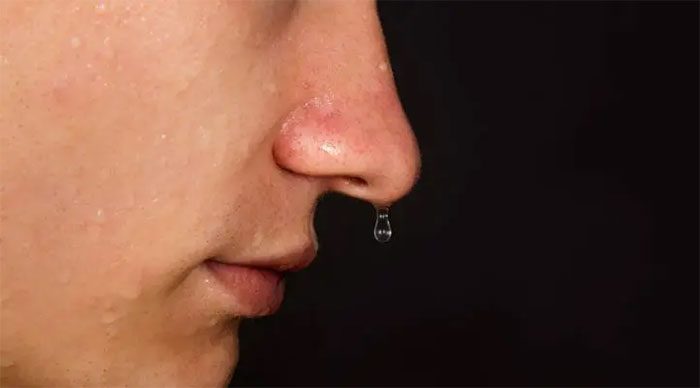Having a runny nose when eating is often related to consuming spicy or hot foods, or it may be a symptom of health conditions such as infections, allergies, or irritants. Rhinitis is a general term used to describe a condition characterized by a runny nose (rhinorrhea) or nasal congestion, often accompanied by symptoms such as sneezing, nasal blockage, itchy nose, or mucus in the throat, coughing, and post-nasal drip.
1. Causes of Runny Nose When Eating
Below are some common causes that may lead to a runny nose while eating:
Gustatory Rhinitis
Gustatory rhinitis occurs when a person consumes spicy or hot foods such as chili peppers, garlic, curry, hot sauce, chili powder, ginger, and other naturally spicy seasonings, which stimulate the trigeminal nerve and cause nasal discharge. Individuals with gustatory rhinitis do not experience any other allergic reaction symptoms but only a runny nose when eating.

There are many reasons that can cause a runny nose while eating. (Image: ST).
Gustatory rhinitis is more common in older adults and often overlaps with senile rhinitis—a type of non-allergic rhinitis. Both conditions are associated with excessive nasal discharge.
You can prevent this condition by avoiding irritating foods such as spicy dishes and using certain medications to control runny nose symptoms after eating, such as topical atropine.
Allergic Rhinitis
Allergic rhinitis is a familiar allergic condition for many people, which can occur seasonally or year-round. Typically, environmental triggers can cause symptoms including dust mites, pollen, or pet dander. However, some individuals may experience allergic symptoms when exposed to or consuming certain foods.
Allergic rhinitis can cause symptoms such as: runny nose, nasal congestion; itchy eyes, itchy mouth, itchy throat or skin; dry eyes; watery eyes; continuous sneezing; fatigue.
Vasomotor Rhinitis
Vasomotor rhinitis, also known as idiopathic rhinitis, occurs not due to allergens but due to environmental and physical changes that cause nasal mucosa swelling, accompanied by post-nasal drip, nasal congestion, continuous sneezing, headaches, sinus pressure, coughing, etc.
Potential triggers contributing to vasomotor rhinitis include certain odors such as perfumes and cigarette smoke; weather changes including humidity, temperature, and air pressure; hormonal changes; emotional shifts; and consumption of irritating foods such as alcohol and spicy dishes.
Non-Allergic Rhinitis
Non-allergic rhinitis can affect both children and adults. Various triggers can cause symptoms of non-allergic rhinitis, such as certain odors or irritants in the air, weather changes, certain medications, foods, and chronic health conditions.
Non-allergic rhinitis is less common than allergic rhinitis and is often misdiagnosed. Doctors will rule out non-allergic causes if no underlying reason for the runny nose is found. Common non-allergic triggers include unpleasant smells, weather changes, cigarette smoke, and specific foods.
There are several types of non-allergic rhinitis, and most share symptoms similar to seasonal allergies, except they tend to have less itching.

A persistent runny nose can become chronic. (Image: ST).
Mixed Rhinitis
Mixed rhinitis is a condition where the patient experiences symptoms of both allergic rhinitis and non-allergic rhinitis. Individuals with mixed rhinitis may experience symptoms such as nasal swelling, runny nose, itchy nose, and sneezing due to both allergic and non-allergic factors. This can lead to discomfort and impact their daily quality of life.
Distinguishing Between Runny Nose and Cerebrospinal Fluid Leak
- A runny nose typically flows from both nostrils, usually does not cause loss of smell, and the nasal discharge can be colored or clear, thick/thin.
- A cerebrospinal fluid leak results in fluid draining from one nostril and can lead to total loss of smell (anosmia), and the fluid is usually clear and watery.
To accurately diagnose the cause of a runny nose when eating, doctors may recommend conducting clinical tests and allergy skin prick tests, nasal endoscopy to check for chronic damage if present, blood tests to find antibodies related to specific allergens, etc.
2. Complications and Treatment of Runny Nose When Eating
The treatment method varies depending on the cause of the runny nose while eating. It may involve avoiding triggers, using over-the-counter medications to alleviate most symptoms such as runny nose, nasal congestion, and sneezing.
For example, if the cause of the runny nose while eating is allergic rhinitis, the doctor may prescribe antihistamines or biological preparations. If the cause is mixed rhinitis, it may be treated with medications aimed at reducing inflammation in the nasal passages, such as oral or nasal spray decongestants, prescription corticosteroid nasal sprays, or anticholinergic nasal sprays.
Note that decongestants are not recommended for everyone. If you are pregnant or have health conditions including high blood pressure, heart disease, glaucoma, or hyperthyroidism, consult your doctor before using.

The treatment method will vary based on the cause of the runny nose. (Image: ST).
Complications from a runny nose are rarely dangerous but can be uncomfortable if this condition occurs frequently and becomes chronic. Common complications from frequent runny nose may include:
- Nasal polyps: harmless benign tumors in the nasal or sinus mucosa.
- Sinusitis.
- Otitis media.
- Reduced quality of life, including difficulties in communication, work, exercise, and sleep.
In conclusion, anything that irritates the inside of the nose can cause a runny nose. Infections—such as colds, flu, or sinusitis, and allergies often cause runny noses and nasal congestion even while eating. Identifying the cause of a runny nose when eating—especially when it occurs frequently—is crucial, as some allergies can be life-threatening and require close monitoring.





















































